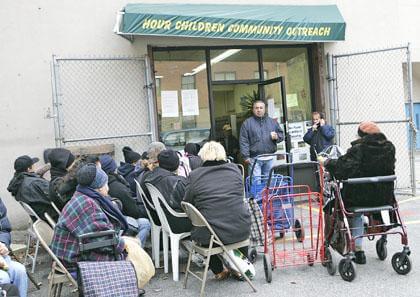By Ivan Pereira
As the economy continues to sour, thousands of residents are lining up at food pantries across the borough to get their daily meals, startling new statistics show.
Although there are dozens of places in the borough that continue to serve hot soups, canned food and other goods, like the First Presbyterian Church of Jamaica, those pantries have also been forced to cut back on their services because they simply do not have the money or resources.
“There’s less food all around,” said Rev. Alberta Mendenhall, who runs First Presbyterian’s food pantry, which implemented a registration system to ration its food. “That impacts our ability to feed people.”
A recent study by the city’s Coalition against Hunger has showed that Mendenhall is not alone and if steps are not taken, Queens and the rest of the city could be facing a serious hunger crisis affecting more residents.
The coalition’s annual hunger survey released three weeks ago indicated that 68 percent of 308 pantries in the city reported they did not distribute enough food to meet demand. In Queens, 84.2 percent of the 59 pantries surveyed indicated that demand for their services increased, but 76.8 percent of the respondents also said they could not meet the higher demand.
“The bad news is that we have more agencies than ever running out of food. The hunger situation, which was truly awful in 2007, has now reached crisis proportions,” Joel Berg, the coalition’s executive director, said in a statement.
The survey did not give descriptions or demographic breakdowns on who is seeking food, but recent figures from the federal government indicate that it is not just the lower class. The U.S. Department of Labor said Friday that 31.6 million Americans, or roughly 10 percent of the national population, are receiving food stamp benefits and the number was expected to rise.
City Harvest Director for Agency Relations Leslie Gordon said the number of people who go to the Queens pantries affiliated with that organization has grown to more than 20,000 in the last few months.
“Most people accessing emergency food programs are not homeless and many are working, yet they fall between the gap where poverty officially ends and self-sufficiency begins,” Gordon said.
The principal cause for the drop in food supplies is cuts to government budgets, according the coalition. Since the federal, state and city governing bodies are trying to close billion-dollar deficits, the money usually given to charity organizations has drastically decreased over the last 12 months, the survey said.
City Harvest and other nonprofits have also seen a drop in financial donations from businesses and residents, since everyone has been keeping a tight watch on their wallets and checkbooks.
Food shipments to First Presbyterian of Jamaica from the United Way were slashed by half and the shipments from the Food Bank for New York City were decreased by a third over the last couple of months, according to Mendenhall.
“Our pantry, we’re limited to 12 cases [of food],” she said. “We would have gotten 36 cases.”
As a result of the shortage, borough pantries have had to change the way they distribute food and most have cut back their food distribution schedule from weekly to monthly.
At First Presbyterian, where more than 200 families attended the church’s annual Thanksgiving dinner, Mendenhall has created a registration system in which participants fill out information that relates to their hunger needs, such as combined family income and the number of people living in the household.
The system is designed to give food to the families that have limited options and has been welcomed by the people who use the pantry, according to Mendenhall,
“The process has weeded out a few people who have been questionable,” she said.
Many of the major nonprofits have already come up with solutions to fight hunger in the borough. The coalition has sent recommendations to Congress on the possibility of creating a stimulus package that increases funding to the federal government’s Emergency Food Assistance Program and food stamps.
City Harvest has started “virtual food drives” for companies in the city. Through special Web sites, employees can directly find information on food pantries and donate their money.
In addition to the Web initiative, City Harvest said it would continue to reach out to generous New Yorkers by reiterating that the city’s hunger crisis is not only a growing problem but also a very critical aspect of the tough economic times. If it is not stopped, New Yorker’s health could be affected, according to Gordon.
“We’re reaching out proactively to partners to reinforce the need this year and the importance of our work, especially during the holiday season, which is a time of heightened food drives and campaigns where we work to deliver extra food to our agency,” she said.
Reach reporter Ivan Pereira by e-mail at ipereira@timesledger.com or by phone at 718-229-0300, Ext. 146.



































